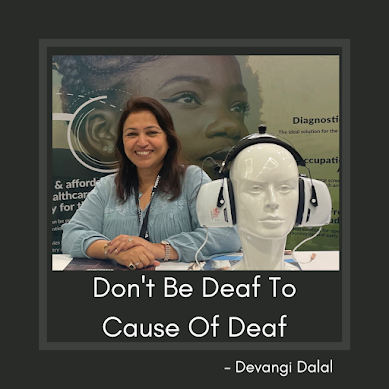Don't be deaf to cause of deaf
|| Don't Be Deaf To Cause Of Deaf ||
Over the years of practicing as an audiologist, I have learned that deaf people often believe that there is nothing wrong with them as individuals, while we hearing people tend to believe that we always need to fix something. Being deaf means that someone cannot hear, resulting in difficulty communicating with others. Despite knowing that we can address these issues, we often remain deaf to them and don't pay attention. Once, while walking on the road, I witnessed a dog barking loudly. It was with its owner, who was about to fall. The dog barked to alert and save its owner. I was amazed at the scenario, realizing how important sound is for staying alert. If the owner had not heard the dog, he might have stumbled and fallen badly. All these years, I have been working to create awareness for people with hearing impairments, aiming to make a positive change and help them participate in the communication era just like normal people. However, this incident made me understand that hearing is not only essential for communication but also crucial for staying alert. We cannot be deaf to this important aspect of hearing.
I once read a beautiful
incident, or rather a conversation between Arjuna and Lord Krishna. Arjuna said
to Lord Krishna, "There are so many devotees of yours in this universe,
and they are all so happy to talk and describe you. Because of that, the whole
universe is smiling. Everyone believes that you are there for them. All the
devilish souls run away when they see you around." Lord Krishna smiled
beautifully and replied, "As you know, I exist everywhere. All my senses
are always alert to see and hear who needs help, and I am there for my devotees
24/7. Those who call me from their hearts, I am always there for them. Just
imagine, the Lord is there to hear us 24/7, and yet, how often do we ignore
hearing someone?"
I was recently discussing with my friend about the causes of hearing impairment, where we work, and what efforts we, as organizations, are putting into raising awareness. We are making significant efforts to help people understand that hearing disability is an invisible yet critical issue. Despite conducting numerous awareness campaigns, camps, lectures, events, and media articles, very few people come forward to support this cause. There are still many myths and misconceptions surrounding hearing disability. In India, one in every four children is hearing impaired, but very little work has been done to address this. My friend, who is also in the medical profession and works in London, pointed out that people eagerly embrace and queue up for the latest Apple model, but when it comes to supporting technological advancements or spending money to assist the hearing impaired, there is a lack of enthusiasm.
As individuals, we must make an effort
to convey the importance of hearing. We need to work hard to make people
realize that hearing is not only crucial for communication but also for being
alert and actively participating in society. Efforts should be made to make
initiatives for hearing impairment as successful as the launch of an Apple
product. The challenge lies in understanding what holds more value—human values
or human desires. A recent WHO report indicates that 5% of the global
population lives with hearing loss, and due to high-tech lifestyles and a lack
of awareness about the dangers of exposure to loud sounds, this percentage is
likely to increase. It is essential to caution youngsters about the potential
risks associated with hearing loss.
Yesterday, a girl came to our
clinic for a hearing test. She had been in an accident a few days ago,
resulting in a severe injury to her right ear with a broken bone and hearing
loss, which was repairable. However, during testing, we discovered that she had
also developed high-frequency hearing loss in her left ear. While discussing
her medical history, her mother mentioned that she extensively uses headphones
and listens to loud music. The girl was not even 25 years old, and yet she had
developed such significant hearing loss. It's crucial to understand that such
damages can be irreversible, and attention should be paid to preventing such
occurrences, which act as additional natural calamities.
By 2030, 1.1 billion young
people are at risk of hearing loss, and this condition can impact
communication, speech, cognition, education, and employment. It also
contributes to social and emotional issues, indirectly affecting economic
matters. Continuous exposure to loud sounds affects the sensory cells within
our ears, which are essential for hearing. Prolonged exposure to loud sounds
can lead to fatigue of these sensory cells, affecting both the overall physical
and mental health of an individual. It creates a vicious cycle, and often, we
are not fully aware of the consequences we are heading towards. Philosophy
suggests that what we hear, how we interpret it, and what we express are
interconnected. Therefore, paying attention to one's hearing and maintaining a
calm environment by reducing noise, along with self-monitoring, is a key
solution for various issues.
It's important to note that promoting awareness
about hearing health doesn't mean advocating for a complete cessation of
listening to music. Music is something universally loved, and every aspect of
nature has its own beautiful music. For instance, at the seashore, you can hear
the gentle and melodious tones of waves. Listening to the wind, the rustle of
leaves, the chirping of birds, or the sounds of animals all contribute to the
natural music of the environment. However, it's the human activities that often
result in loud and potentially harmful noises. We face the consequences of our
actions, and this situation is a result of collective decisions.
"Love your music, protect
your ears" implies not only enjoying the music around you but also
appreciating the natural melodies and being mindful of your surroundings. It
encourages individuals to listen to the music of nature and their own souls to
protect their ears from the noise in the environment and from noisy
individuals. As someone rightly said, "Control the noise before the noise
controls you."




.jpeg)
.jpeg)
.jpeg)




Comments
Post a Comment